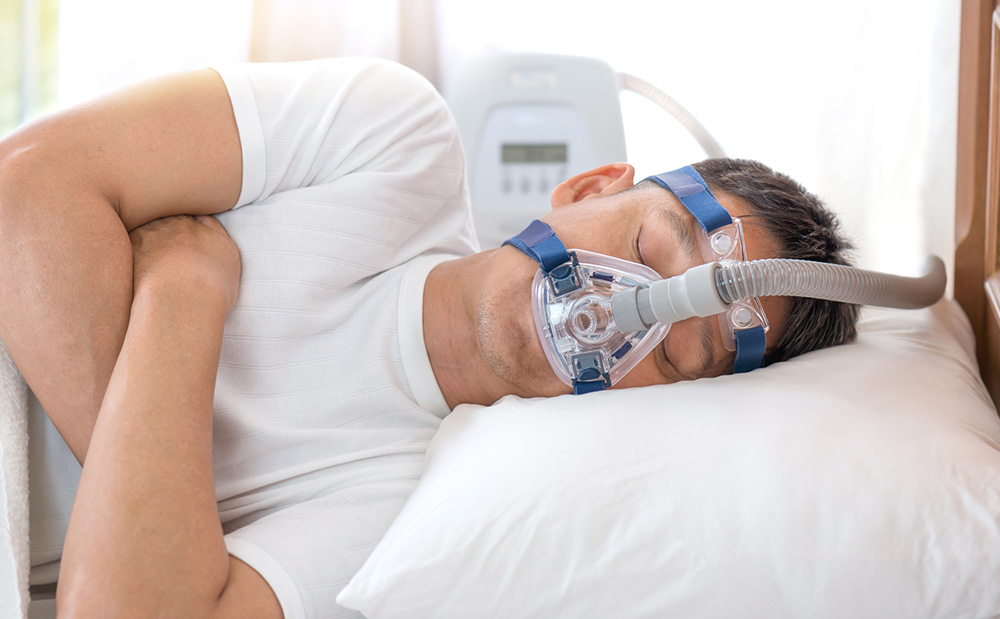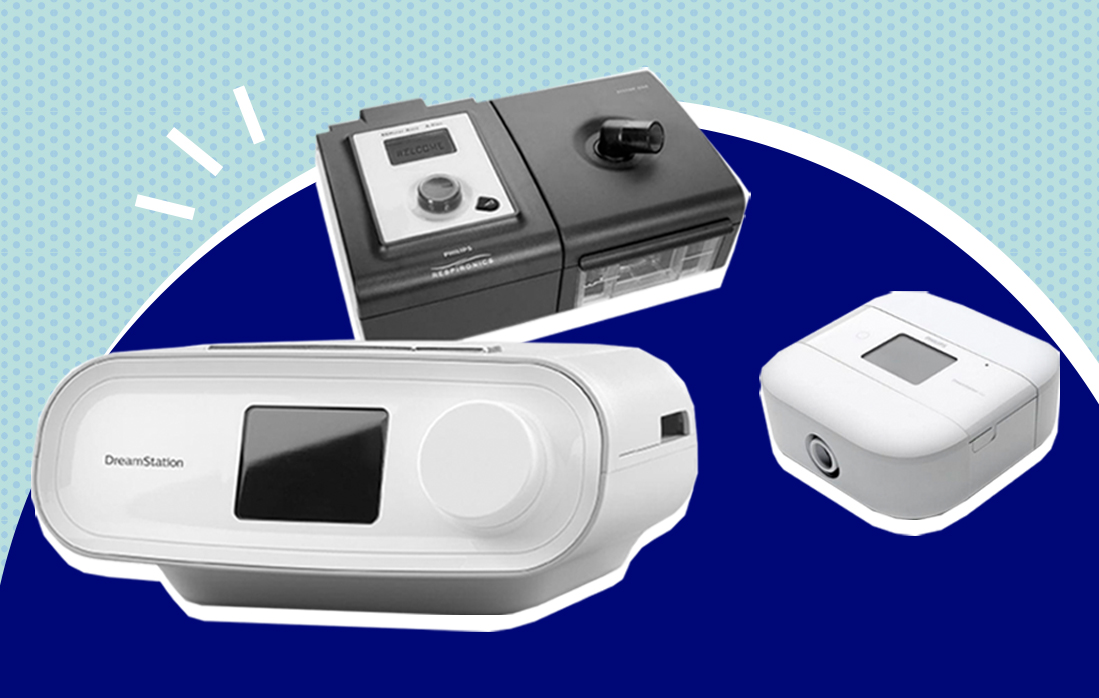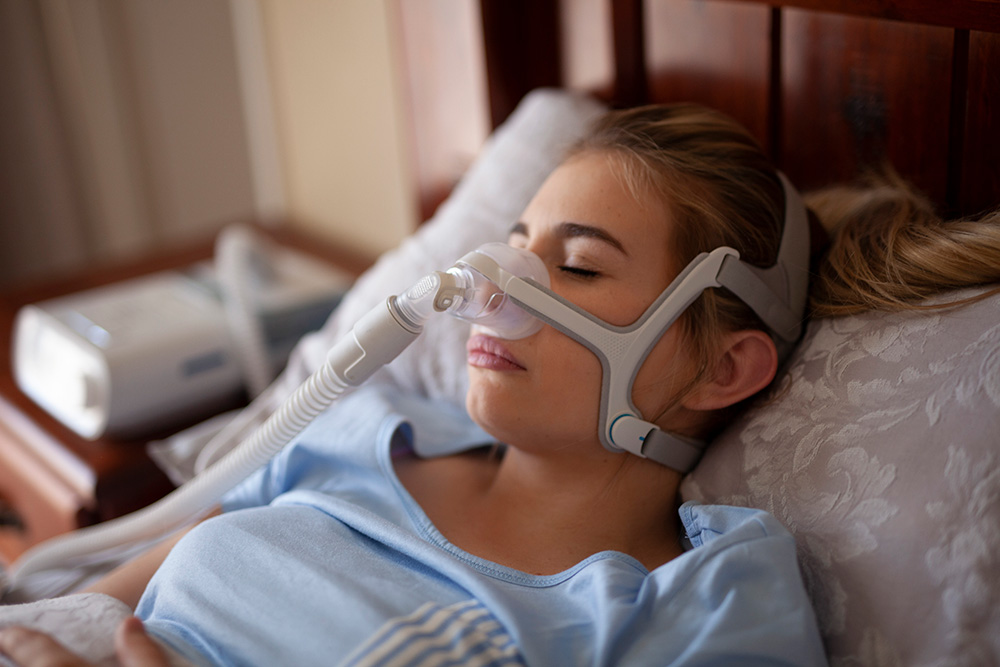
Doctors and researchers have long known that obstructive sleep apnea can rear its head during pregnancy. And while we know, with some degree of certainty, how it affects moms-to-be, researchers haven’t been able to say (with the same certainty) how maternal OSA affects their newborn babies — until now.
According to a new study published in the American Journal of Perinatology, babies born to mothers who struggle with sleep-disordered breathing (SDB), like snoring and sleep apnea, are more likely to develop health issues such as low blood sugar, jaundice, and seizures. (1) In some cases, health complications stemming from maternal sleep-disordered breathing can even lead to death during the newborn period.
Researchers Link Maternal OSA to Adverse Health Outcomes for Newborns
Led by Dr. Arlin Delgado of the University of South Florida, researchers collected at-home sleep monitoring data from 2,100 pregnant women at two distinct points in their pregnancy — once in early pregnancy (6 to 12 weeks) and again in mid-pregnancy (22 to 31 weeks).
Using the apnea-hypopnea index (AHI), mothers were marked as having sleep-disordered breathing if they had five or more apneas (breathing cessation) or hypopneas (slowed breathing) during the night. Using those parameters, the researcher found that 3 percent of mothers had sleep-disordered breathing in early pregnancy, and 5.7 percent developed SDB in mid-pregnancy.
Post-delivery, infants were assessed for respiratory distress syndrome and transient tachypnea (temporary rapid breathing).
Researchers also looked at:
- The number of infants who required respiratory support
- The number treated for newborn jaundice or low blood sugar
- Those that were large for their gestational age
- Incidences of seizures and sepsis
- Newborn deaths
Ultimately, researchers found that babies born to mothers who showed signs of sleep-disordered breathing in early pregnancy shared a similarly low risk of adverse health outcomes to those whose mothers showed no signs of SDB. Meanwhile, babies born to moms who developed sleep-disordered breathing mid-pregnancy had a 42 percent higher risk of adverse health outcomes and neonatal death.
Evidence suggests that OSA may resolve itself in the weeks and months following delivery, so many women may opt to ride it out. And while this new research connects the dots between OSA that develops during pregnancy and newborn health issues, it remains unclear if treating SBD in pregnant moms will improve the health outcomes for their babies.
What Is Obstructive Sleep Apnea?
Obstructive sleep apnea (OSA) is a common sleep disorder where the airway collapses during sleep, usually as a result of the muscles at the back of the throat relaxing enough to impair breathing. (2) (3) A partial airway collapse is known as hypopnea, and a complete collapse is an apnea. Apneas can last anywhere from 10 to 20 seconds at a time, and depending on the severity of the condition, they happen hundreds of times per night.
What Causes Obstructive Sleep Apnea during Pregnancy?
“Physiological changes in pregnancy, such as weight gain and increases in BMI, are the leading causes of OSA during pregnancy,” says Carleara Weiss, Ph.D., MSH, R.N., and Sleep Science Advisor for Aeroflow Sleep. Weiss adds, “Changes in the upper airway, nasal congestion, narrowing of the oropharyngeal area (structures in the back of the throat), and changes in oxygen consumption” (as a result of a growing fetus and reduced lung capacity) can also contribute to OSA during pregnancy.
Weiss notes that “Pre-pregnancy obesity can also increase the risk or exacerbate OSA,” as does the propensity for mothers to sleep on their backs. (4)
Should You Be Concerned If You Have OSA during Pregnancy?
Apneas or pauses in your breathing while sleeping often cause the sleeper to wake up in order to resume breathing. So, on the surface, obstructive sleep apnea typically leads to poor quality sleep, fragmented sleep, and next-day fatigue and grogginess.
Weiss adds that “obstructive sleep apnea during pregnancy is linked to severe maternal morbidity, increased risk for gestational hypertension (high blood pressure), eclampsia, pulmonary embolism, and gestational diabetes.” (5) (6)
She also reminds us that the complications from OSA during pregnancy aren’t limited to the mother. While this newest study shows gestational OSA can lead to low blood sugar, jaundice, seizures, and death, Weiss adds that maternal OSA also increases the risk of pre-term birth and abnormal fetal heart rate. (7)
How to Tell If You Have Obstructive Sleep Apnea During Pregnancy
While Weiss notes that “the classic symptom of obstructive sleep apnea is snoring and gasping for air during sleep,” she cautions that “pregnant women are also more likely to snore in the third trimester.” (8) Ultimately, that means that snoring is not always the smoking gun. (3)
To that end, Weiss suggests looking for other telltale signs of obstructive sleep apnea, like
- Restless sleep/frequent waking
- Night sweats
- Increased irritability
- Excessive daytime sleepiness
- Waking up with a dry mouth, dry throat
- Waking up with headaches
What Should You Do If You Think You Have OSA and Are Pregnant?
If you suspect you have OSA while pregnant, it’s best to see your doctor.
While your doctor will probably do an in-office evaluation, they’re more likely to refer you to a sleep specialist for a definitive diagnosis. According to Weiss, “The preferred diagnostic tool for sleep apnea is an overnight sleep study or polysomnography. While most insurance companies prefer an in-lab study for diagnosis, home studies with portable devices are an option.”
With a typical polysomnogram, a trained sleep tech monitors your breathing, heart rate, and the depth of your sleep cycles using sensors and video monitoring in a laboratory setting.
Polysomnograms are used to determine whether your OSA is mild (AHI between 5 and 15 events per hour), moderate (AHI between 15 and 29 events per hour), or severe (30+ AHI events per hour) and to develop a treatment plan that works for you.
What Is the Treatment for Obstructive Sleep Apnea During Pregnancy?
Ultimately, your treatment plan will depend on the severity of your symptoms. While Weiss notes that an “oral appliance for OSA may be sufficient to manage the problem, she notes that Continuous Positive Air Pressure (CPAP) is the gold standard treatment for OSA during pregnancy.” (9)
And while some women may have reservations about trying CPAP therapy while pregnant, Weiss tells us that “CPAP is safe and generally the first choice of treatment for OSA during pregnancy.”
Other options for managing OSA during pregnancy include:
- Saline sprays to help reduce nasal congestion
- Nasal strips that open up your nostrils to help you breathe while you sleep
- Weight management that includes exercise and dietary changes
- Positional therapy: Sleeping on your back can worsen OSA symptoms. For that and other health-related reasons, pregnant women are encouraged to sleep on their left side. In this case, body pillows and pillow wedges can help ease any discomfort.

Sleep Apnea Causes and Treatments

Baby Sleep Safety: Everything to Know in 2025

FDA Assigns its Most Serious Designation in New Philips CPAP Machine Recall: What to Know

If We Want People to Use Their CPAP Machines, They Need to Be Easier to Use: Opinion
Sources
1. Delgado A, Kendle AM, Randis T, et al. Association between Sleep Disordered Breathing and Neonatal Outcomes in Nulliparous Individuals [published online ahead of print, 2024 Jul 29]. Am J Perinatol. 2024;10.1055/a-2115-0147. doi:10.1055/a-2115-0147
2. Benjafield AV, Ayas NT, Eastwood PR, et al. Estimation of the global prevalence and burden of obstructive sleep apnoea: a literature-based analysis. Lancet Respir Med. 2019;7(8):687-698. doi:10.1016/S2213-2600(19)30198-5
3. Slowik JM, Sankari A, Collen JF. Obstructive Sleep Apnea. [Updated 2022 Dec 11]. In: StatPearls [Internet]. Treasure Island (FL): StatPearls Publishing; 2024 Jan-. Available from: https://www.ncbi.nlm.nih.gov/books/NBK459252/
4. Ghesquière L, Deruelle P, Ramdane Y, Garabedian C, Charley-Monaca C, Dalmas AF. Obstructive sleep apnea in obese pregnant women: A prospective study. PLoS One. 2020;15(9):e0238733. Published 2020 Sep 8. doi:10.1371/journal.pone.0238733
5. Lungeanu-Juravle L, Patrascu N, Deleanu OC, Cinteza M. The Role of Obstructive Sleep Apnea in Developing Gestational Hypertension and Preeclampsia. Maedica (Bucur). 2016;11(4):330-333.
6. Bublitz MH, Monteiro JF, Caraganis A, et al. Obstructive Sleep Apnea in Gestational Diabetes: A Pilot Study of the Role of the Hypothalamic-Pituitary-Adrenal Axis. J Clin Sleep Med. 2018;14(1):87-93. Published 2018 Jan 15. doi:10.5664/jcsm.6888
7. Sun, J.-C., Lin, C.-L., Wu, F.-L., Chung, C.-H., Sun, C.-A., & Chien, W.-C. (2022). The association between obstructive sleep apnea and the risk of poor delivery events in women: A population-based nested case–control study. Journal of Nursing Scholarship, 54, 31–37. https://doi.org/10.1111/jnu.12708
8. Dominguez JE, Habib AS. Obstructive sleep apnea in pregnant women. Int Anesthesiol Clin. 2022;60(2):59-65. doi:10.1097/AIA.0000000000000360
9. Batool-Anwar S, Goodwin JL, Kushida CA, et al. Impact of continuous positive airway pressure (CPAP) on quality of life in patients with obstructive sleep apnea (OSA). J Sleep Res. 2016;25(6):731-738. doi:10.1111/jsr.12430
10. Weiss, Carleara, Ph.D., MSH, RN. Author interview. September 13, 2024.


























